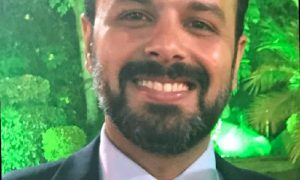Kailash Gupta is studying for a dual degree course from Cornell Law School. The course will certify him as a JD and as an MBA on completion. Having been educated in the US he has deep insight of the US education system which he shares with us in this interview.
In this interview he tells us about:
- Working as a paralegal at NOVA IP Law firm
- Studying and clearing for LSAT
- Studying for JD/MBA from Cornell Law School and Johnson Graduate School of Management
- The top prerequisites for a legal career in the US
Given that most of our readers are law students and young lawyers, how will you introduce yourself to them?
Hi! I am Kailash and I am currently a JD/MBA Candidate at Cornell Law School and the Johnson Graduate School of Management. I plan to work in a New York City law firm as a transactional attorney.
Amongst the various career options, what motivated you to choose law?
My decision to pursue a career in law came after exploring many different career paths as an undergraduate. I have an undergraduate degree in Economics and pursuing a degree in law, with a focus in business law, seemed like the best way to satisfy both my intellectual and analytical needs.
You have been educated in the United States. How difficult would it be for others to integrate into the education system of US?
I was born and raised in New Jersey and have not completed any sort of formal education outside the United States. That being said, integrating into American undergraduate institutions or law schools should not be an issue for international students. At Cornell and other top ranked universities, school administrators and admissions officers have recently put a greater emphasis on attracting top talent from abroad. I commonly hear several different languages being spoken as I walk through campus (including my native Telugu). International students have several student groups on campus and many US-born students are eager to make connections with students from abroad.
You are pursuing Juris Doctor Degree from Cornell Law School. What was the application procedure? Are there any entrance tests?
Cornell Law School, along with the majority of other US law schools, require applicants to write a two-page personal statement along with optional essays, including addendums to explain any issues or weak spots in one’s application. Furthermore, each applicant is required to take the Law School Admission Test (LSAT).
How did you prepare for the entrance test? Please tell us about the top three things you kept in mind while preparing for the test. Would you say it was difficult to take the test?
The LSAT consists of a total of six 35-minute sections. The sections include one writing sample, two logical reasoning (LR) sections, one reading comprehension (RC) section, one logic games (LG) section, and one experimental section. The experimental section is either a LR, LG, or RC section and does NOT count to the overall score. The writing sample is also not incorporated into the overall score, though each school to which one sends his or her score will be able to view the essay.
Top US law schools have trouble comparing candidates across different undergraduate universities and majors. Unlike other graduate schools such as medical school, law schools do not require students to take specific undergraduate classes before applying. Therefore, law school admissions officers primarily compare students based on their LSAT scores. An applicant’s undergraduate GPA, major,and institution are secondary to one’s LSAT score. Work experience comes in as the third most important criterion. Therefore, high performance on the LSAT is imperative for gaining admission.
My basic approach was to first learn the strategies of taking the exam. Investing in exam prep materials is highly encouraged. Secondly, once I was equipped with the basic strategies of how to tackle each question type in each section of the test, I spent significant time taking practice sections and full-length tests.
After each test or section, I would review the questions I got wrong, identify the question type, and practice those specific types until I was able to consistently answer them correctly. A final point to remember is the exam takes over four hours to administer. Test-takers should prepare for the mental marathon that is taking the LSAT. The best way is to take full-length tests leading up to the exam date. Still, be careful not to burn out and make sure to be well rested on exam day.
What prompted you to choose Cornell for a JD? Were there any other Universities in mind?
I was fortunate enough to be choosing between two highly ranked law schools, Georgetown University Law Center and Cornell Law School. GULC and Cornell each have their strengths. GULC is located in Washington D.C., the nation’s capital. Its location puts it in close proximity to some of the greatest legal minds of the country, which include legislators, practicing attorneys, and even the U.S. Supreme Court Justices. Furthermore, Washington D.C. has more lawyers per capita than any other city in the country. Cornell, on the other hand, is a small school with a tight-knit community. Ultimately, its small size, elite faculty, extremely strong placement into big law firms, and strength in business law made it the ideal fit for me. I also completed my undergraduate degree at Cornell so I was fully accustomed to Ithaca.
You had received the ‘CALI Excellence for the Future’ Award. What qualified you for this recognition?
The Center for Computer-Assisted Legal Instruction is a non-profit dedicated to facilitating computer assisted legal education. The CALI Excellence for the Future Award is given to students who receive the highest grade in each course, each semester, in participating law schools. I received the award in my first semester for the Torts and Lawyering courses.
What does it mean to be on the Dean’s List at the Cornell Law School?
Dean’s List is given to students who stand in the top 30% of the class for each semester of grades.
How important do you think are internships in shaping up the career of a person?
Pursuing internship(s) as a law student is imperative in securing a job post-graduation. I am in a unique situation because I am pursuing the dual degree. Dual-degree students are required to take summer classes at the business school instead of pursuing a first-year internship. Most pure JD students either do research for professors or intern for a judge, government agency, or non-profit during their first year summer. At the end of the second year of study at the law school, most students, including the dual-degree students, pursue a summer associate position at a law firm.
The second-year internships are very important in securing a job post-graduation because the vast majority of big law firms extend full-time employment offers to their summer associates. While many law students do not plan to work in big law firms in the long run, many nonetheless pursue these second-year summer associate positions and even accept full-time offers. The reason is that it is generally believed that work in big law firms prepare you for a career in government or business.
You are also pursuing an MBA from Johnson Graduate School of Management. What motivated you to take it up? Would you say an MBA would better equip you in a legal career?
As a law student with aspirations to work as a transactional attorney, pursuing an MBA was a no-brainer. Transactional attorneys are constantly poring over business documents in their daily work. Furthermore, transactional attorneys are often called upon to advise their clients in making decisions that directly affect a client’s business.
Having a working knowledge of how large businesses operate, which an MBA will undoubtedly provide, is a major benefit when beginning your career as a transactional attorney. Furthermore, the opportunity cost of one-year’s worth of salary normally associated with pursuing a dual degree program does not exist in Cornell’s three-year program.
You began your professional career with NOVA IP Law as a Paralegal. How did you apply? What did your work profile consist of? Did it require knowledge of law?
I applied for the position through Cornell’s job posting website prior to graduation as an undergraduate. The position did not require any prior knowledge of law. Working as a paralegal is a great introduction into the legal field and serves as an opportunity for one to really decide if a career in law is the right one.
I worked in a small firm outside Washington D.C. and the experience solidified my desire to pursue a career in law. I assisted attorneys in legal research, edited and wrote contracts and court documents, and also took on all the clerical tasks associated with office management. Other than that, I also had the opportunity to manage several attorneys and paralegals working on a short-term basis in a document review project.
What does being a Paralegal mean? How different is it from being an associate at a law firm?
A paralegal is a legal assistant and serves essential functions in a law firm. Paralegals are often divided into two distinct categories, career paralegals and short-term paralegals. Career paralegals pursue the position as a career while short-term paralegals are often recent college graduates who are looking to work in the legal field before pursuing a law degree. Because I worked in a small firm I was able to take on some of the tasks that normally would be reserved for career paralegals in larger firms. A friend of mine worked as a paralegal in a large firm in Los Angeles and told me that several of the career paralegals were highly sought after by the firm’s partners when staffing different projects. Whereas first-year and second-year associates have minimal practical understanding of real world law practice, most career paralegals more often than not have a better working knowledge of the law.
Even in our Law course, our professors constantly reminded us to turn to the staff paralegals as sources of help when navigating the big law waters as a fresh-out-of-law-school associate.
What are your plans for the coming five years?
I plan to finish my degree program in 2016 and work as an associate in a law firm in New York City for the foreseeable future.
What are the top prerequisites for a successful legal career in the U.S. for people from other countries?
Depending on your career goals and aspirations, the unfortunate truth for international students aspiring to work in the US as a lawyer is that they must pursue a JD. Most LL.M. students I speak to tell me that it is very difficult to secure a job with a big law firm with just an LL.M. Many LL.M. students sit for the New York bar at the end of their programme and utilize their bar admission through international deals or litigation.
Beyond the degree itself, law firms look for strong oral and written communication skills and top grades regardless of the fact whether you are an international or a domestic student. International students should stay updated on the status of US legal employment market. The past seven years have been especially tough for law students in finding employment and a huge bracket of unemployed law graduates exists. The fair logical leap is that most firms, regardless of size, are going to choose a domestic candidate as the more costly international ones need to be paid higher.
Give us a few tips on finding out the right university for a J.D or an LL.M.
If any readers are interested in pursuing a JD or LL.M. at a US law school some helpful sources include:
top-law-schools.com: This website has helpful information on constructing personal statements, school profiles and rankings, LSAT preparation, etc.
lawschooltransparency.com: This website has helpful employment statistics for easy comparison between U.S. law schools.
























